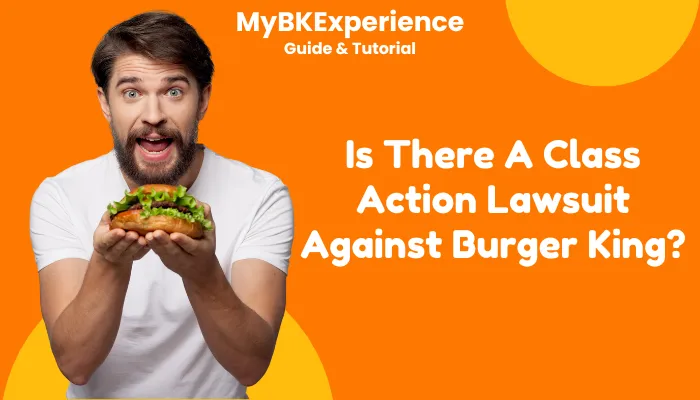Burger King faces a class action lawsuit over allegedly misleading advertisements, with customers claiming that its food, particularly the Whopper, appears significantly larger in ads than in reality. This lawsuit raises questions about consumer rights and the ethical boundaries of fast-food marketing. Is there a class action lawsuit against Burger King? Yes, and its outcome could impact industry standards.
Meanwhile, customers sharing their dining experiences through MyBkExperience surveys may influence Burger King’s future policies and marketing strategies.

Understanding the Burger King Class Action Lawsuit
Customers have raised concerns over Burger King’s alleged misleading marketing tactics. Several legal actions have been filed, but what are they really about?
Key Allegations Against Burger King
The primary claims in the lawsuit include:
- Exaggerated food portion sizes – Advertisements show larger burgers than what customers receive.
- Misleading promotional images – The marketing doesn’t match real-life products.
- Violation of consumer protection laws – False advertising could breach regulations.
The lawsuit questions Burger King’s advertising practices and consumer rights. Legal proceedings will determine if compensation is warranted. Customers await clarity on misleading marketing claims. The fast-food industry watches as the case unfolds.
Burger King Lawsuit: Whopper Size Misleading?
Yes, there is. A lawsuit filed in 2022 accuses Burger King of overstating the size of its burgers in ads. The Whopper, which is at the center of the case, appears much larger in advertisements than in reality.
Timeline of the Lawsuit
| Date | Event Description |
|---|---|
| March 2022 | Initial lawsuit filed in Florida |
| July 2022 | Burger King filed a motion to dismiss the case |
| August 2023 | A judge ruled that the case could proceed |
| 2024 | Case developments continue |
Is there a class action lawsuit against Burger King? The case is still ongoing, with new developments expected. Customers continue to challenge the fast-food giant’s advertising claims.
Burger King’s Response to the Lawsuit
Burger King has denied any wrongdoing and argues that advertising is not a guarantee of product size. The company claims that:
- Marketing is meant to be illustrative.
- Customers understand that ads may be exaggerated.
- Competitors also use similar advertising techniques.
Legal Arguments from Both Sides
Both sides present strong arguments in the Burger King lawsuit over misleading ads.
Plaintiffs’ Side (Consumers):
- Misrepresentation violates consumer trust.
- The actual burger size differs by up to 35% from ads.
- Other companies have faced similar legal repercussions.
Burger King’s Defense:
- Ads are not contracts.
- No official standard dictates how products must appear in ads.
- Other fast-food chains also use visual enhancements in ads.
The lawsuit challenges how fast-food ads shape customer expectations. Burger King continues to defend its marketing practices in court.
Similar Cases Against Other Fast-Food Chains
Burger King is not alone in facing such lawsuits. Other fast-food giants have been accused of similar misleading tactics.
Notable Cases:
| Company | Allegation | Outcome |
|---|---|---|
| McDonald’s | Oversized Big Mac ads | Dismissed |
| Taco Bell | Skimping on fillings in promo images | Ongoing |
| Subway | “Footlong” sandwiches measuring under 12 inches | Settled |
Is there a class action lawsuit against Burger King? Yes, and other fast-food chains have faced similar claims. Legal battles over misleading ads continue across the industry.
Burger King Lawsuit: Impact on Sales and Trust
While the lawsuit has not yet impacted Burger King’s revenues significantly, negative publicity can influence consumer trust. Some key factors include:
- Social media backlash reducing brand loyalty.
- Potential compensations affecting company profits.
- Stronger regulations for future advertisements.
Is there a class action lawsuit against Burger King? Yes, but its financial impact remains uncertain. Consumer trust and legal costs could shape future outcomes. The fast-food industry watches closely as the case unfolds.
Customer Reactions and Public Opinion
Public response to the Burger King lawsuit is mixed. Some customers feel misled, while others see it as standard advertising. The debate continues over marketing ethics in fast food.
Consumer opinions vary regarding the lawsuit.
Common Customer Reactions:
- Disappointed: Many feel deceived by the ad sizes.
- Indifferent: Some argue that all fast-food chains do this.
- Supportive: Loyal customers believe it’s just marketing.
Reactions to the lawsuit highlight differing views on advertising practices. Some demand accountability, while others dismiss the claims. The case fuels discussions on truth in marketing.
Burger King Lawsuit: Possible Compensation for Customers
Is there a class action lawsuit against Burger King? Yes, and it could lead to compensation for customers. If successful, Burger King may offer refunds or discounts. The case also pressures the company to improve advertising transparency.
If the lawsuit succeeds, Burger King may have to compensate affected consumers. This could be in the form of:
- Refunds to customers who purchased misleading products.
- Coupons or discounts for future purchases.
- Policy changes to ensure transparent advertising.
Is there a class action lawsuit against Burger King? The outcome remains uncertain, but consumers may benefit. Legal rulings could set a precedent for fast-food marketing.
What Should Customers Do Next?
Customers wondering about their options can take steps to stay informed. Following lawsuit updates and gathering proof may help with potential claims.
If you believe you have been misled, you might:
- Stay updated on lawsuit progress.
- Join the class action if eligible.
- Provide receipts or proof of purchase if needed.
Is there a class action lawsuit against Burger King? Yes, and affected customers may have the chance to join. Staying informed ensures you don’t miss any compensation opportunities.
Conclusion
Is there a class action lawsuit against Burger King? Yes, and the case may have consequences for both consumers and the fast-food sector. It poses a challenge to the ethical principles of advertising; in one way or another, policy revisions, compensations, or stricter advertising regulations will have to be put in place to resolve the case. Both consumers and businesses await the final verdict. Consumers who are affected should stay up to date on the status of the case to exercise their rights. The outcome will most likely change how fast-food chains market their products.
